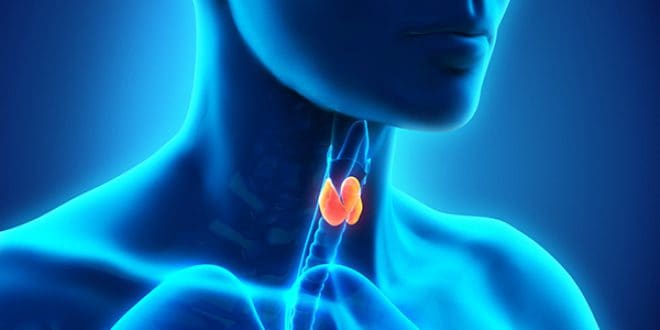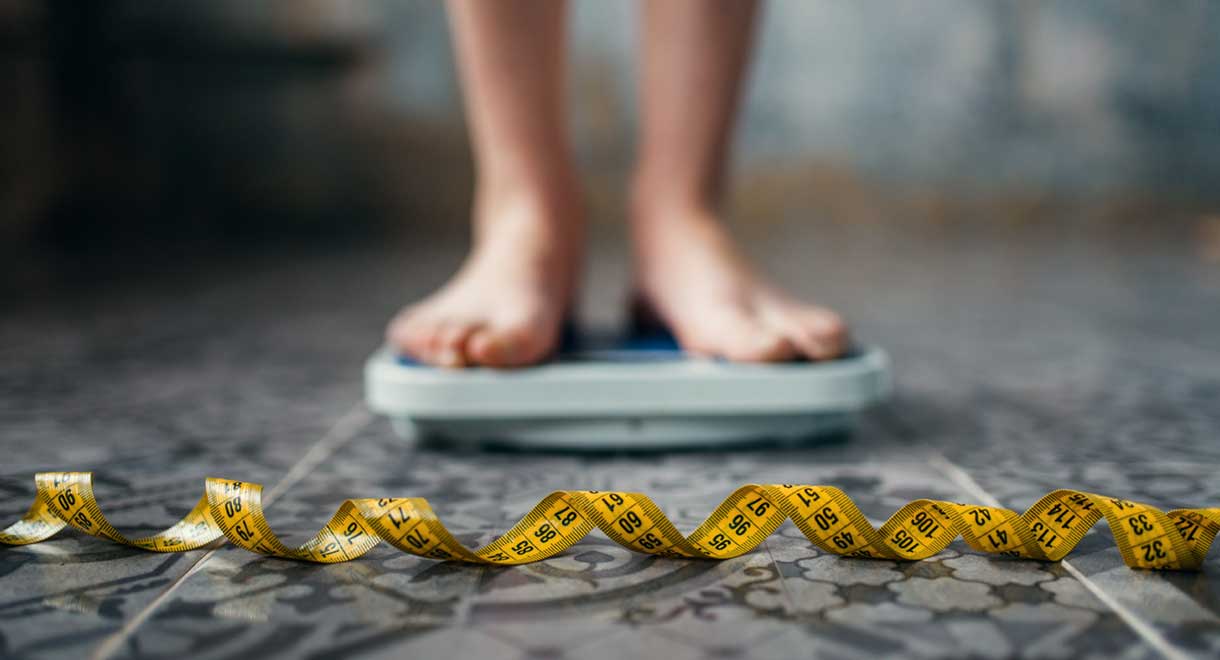By naturopath Margaret Jasinska
Thyroid problems are far more common in women than men. It is extremely common for them to first manifest after giving birth. This condition is known as postpartum thyroiditis. It just means inflammation of the thyroid gland. In most causes the cause is autoimmune disease.
Postpartum thyroiditis occurs in five to nine percent of women during the first six months after giving birth. The thyroid gland can become enlarged but this is usually not painful.
Symptoms of postpartum thyroiditis
There are usually two phases to this disease: first hyperthyroidism, then hypothyroidism.
In the first phase, while the thyroid gland is inflamed it releases too much hormone into the bloodstream. This phase usually lasts two to four months and it causes the metabolism to speed up. Women commonly experience the symptoms of hyperthyroidism such as: weight loss, a rapid heart rate, anxiety, increased sweating and sensitivity to heat. These symptoms are usually quite mild and many women barely notice them.
In the second phase, the thyroid gland does not produce enough hormones, and this causes the symptoms of hypothyroidism. This phase can last up to a year.
Some women develop a goitre (enlarged thyroid gland); other symptoms can include: depression, fatigue, sensitivity to cold, constipation, dry skin and brittle nails, weight gain and hair loss. The condition can be diagnosed by measuring levels of the hormones TSH, T3 and T4 in the blood, as well as thyroid antibodies.
What causes postpartum thyroiditis?
The condition is an autoimmune disease. The body’s immune system incorrectly identifies the thyroid gland as a foreign invader and produces antibodies to destroy it. While women are pregnant, their immune system becomes somewhat suppressed so that they don’t produce antibodies that could harm the developing foetus. This is partly due to high levels of progesterone during pregnancy. After delivery, the immune system becomes reactivated again. It is during this time that the thyroid gland can become inflamed from postpartum thyroiditis. Some women have thyroid antibodies in their bloodstream while pregnant and approximately 30 to 50 percent of them will go on to develop postpartum thyroiditis.
Women with the following conditions are most at risk of developing postpartum thyroiditis:
- High levels of antithyroid antibodies during the first trimester of pregnancy.
- An immune system disorder or autoimmune disease, such as type 1 diabetes, rheumatoid arthritis, coeliac disease or lupus. Women with type 1 diabetes are three times more likely to develop postpartum thyroiditis than non-diabetic women.
- A personal or family history of thyroid disease, for example Graves’ disease or Hashimoto’s thyroiditis.
- Goitre (enlarged thyroid gland).
- A history of postpartum thyroiditis. Women who have had this condition with one pregnancy have a 20 percent chance of being affected in subsequent pregnancies.
- Women with antithyroid antibodies in their bloodstream are at increased risk of infertility, miscarriage and postpartum depression.
Treatment of postpartum thyroiditis
In the first phase, when the thyroid gland produces excessive levels of hormones, symptoms are often mild and require no treatment. If tremors and a rapid heart rate are present, beta blocker drugs can be given for a short time to relieve these symptoms. During the second phase, when the thyroid cannot produce adequate hormones, thyroxine (T4) hormone replacement is usually given to restore normal hormone levels. Very little of the prescribed thyroid hormone passes through the placenta to the foetus, or into breast milk. It is safe to use while pregnant or breastfeeding. Suffering from untreated hypothyroidism while pregnant or breastfeeding can have dangerous consequences to the intellectual development of a newborn baby.
Most women take prescription thyroxine tablets for approximately six months. After that time, the patient will be told to stop the tablets for four to six weeks and have a blood test for TSH, T4 and T3 hormones. This lets us know if the hypothyroidism is permanent, or if the thyroid has recovered and can now produce its own thyroid hormones again. Around 25 to 30 percent of women are left with permanent hypothyroidism and they must take prescribed thyroid hormone replacement for life.
All women who have had postpartum thyroiditis are at increased risk of developing Hashimoto’s thyroiditis later in life, or another autoimmune disease.
Minimising the risks of postpartum thyroiditis
After giving birth, many women experience several months of exhaustion and emotional upheavals. Many women also experience postnatal depression and this can become very debilitating if not recognised and treated. It is very important to have your thyroid function tested regularly by your doctor because postpartum thyroiditis is easily treated and it may be causing you unnecessary suffering.
If you are planning pregnancy, make sure you ask your doctor to do a blood test for antithyroid antibodies and TSH; especially if you:
- Have an autoimmune disease. In particular type 1 diabetes, but also rheumatoid arthritis, lupus, coeliac disease and others.
- Have a goitre.
- Have a thyroid disease.
- Have a strong family history of thyroid disease.
- Have had postpartum thyroiditis before.
The holistic treatment of postpartum thyroiditis involves restoring healthy immune system function. This requires some diet changes and use of nutritional supplements. For more information see our book “Healing Autoimmune Disease: A plan to help your immune system and reduce inflammation”, or the book “Your Thyroid Problems Solved”.
For enquiries about a consultation phone 02 4655 4666 or email margaretj@www.cabothealth.com.au









Leave A Comment